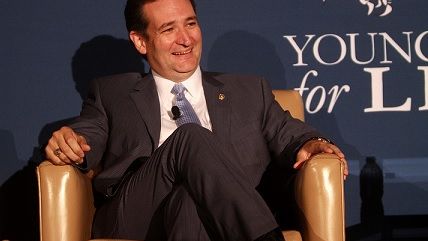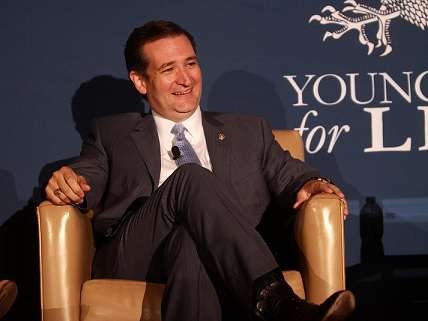The Remaining Presidential Candidates Mostly Suck on Criminal Justice Reform
Voters don't seem to mind.


Rand Paul is out, and with him the hope that criminal justice reform will be anything more than a signaling exercise (on both sides) in the 2016 presidential campaign.
Ted Cruz, whose campaign strategy has been to adopt whatever ideology fits the voting population he's trying to woo on that particular day, has already abandoned much of his criminal justice reform positions in the quest to win social conservative votes. He's flip-flopped on marijuana too—he now opposes the federal government cracking down on states that have legalized it. That may be one of the few criminal justice reform bright spots left in the Republican race.
John Kasich is the other. The Republican governor of Ohio has actually made progress in his state on criminal justice reform. A state police-community advisory panel that wasn't just packed with political cronies came up with nearly two dozen recommendations, including limiting use of force policies and requiring the use of body cameras. Unfortunately, it's part of his record that doesn't often come up in conversations about the Republican race.
Most of the remaining candidates have spent almost no time substantively engaging issues of criminal justice reform. A year ago it looked like criminal justice reform would be an unavoidable topic in the 2016 elections. "There is an emerging consensus that the time for criminal justice reform has come," Marco Rubio wrote in a book released by the Brennan Center that featured essays from many of the presidential candidateds. "A spirited conversation about how to go about that reform has begun."
And now the conversation is over. The blame belongs to the candidates but also to voters. The presidential candidates who have succeeded in getting this far have largely done so by appealing to their bases' emotions—class envy for Democrats and fear for Republicans.
Dr. Ben Carson has used his upbringing in inner city Detroit to call on "intensifying" the war on drugs. In a BET candidate forum, he said restoring respect between police and the communities they serve was important, and blamed police reform activists on "sowing division." He did, at least, use the venue to oppose mandatory minimum sentencing laws.
"We need to take care of police officers because they take care of us," Carson said, avoiding the issue of police unions like every other Republican who is usually skeptical of public unions in other contexts. "For those who don't like police officers, I'd like you to think about what your life would be like if they weren't around for 24 hours. It would be awful." Carson doesn't sound like someone who understands how the small government principle of having less laws would apply to the issue of police brutality.
Marco Rubio, now the closest thing the establishment has to a frontrunner, has promised to crack down on states that legalized marijuana. And while he's said he knows people who have been racially profiled and found it "deeply disturbing," he didn't see a role for Congress in the debate about race and policing. So much for a conversation.
That betrays a poor grasp of the problems surrounding police brutality, and a too-eager willingness to ignore the role the federal government has played in militarizing local police over the last thirty years. Like Carson, Rubio also ignores the federal government's role in propagating the idea of more laws and imposing more controls on people, controls that trickle down and are ultimately the driving forces of many of the most questionable interactions between police and residents.
As governor of Florida, Jeb Bush pushed a strict mandatory-minimum sentencing proposal that would require a mandatory sentence of 20 years if a gun was fired in the commission of certain felonies, and 25 to life if the use of that gun caused an injury or death. He supports more spending the war on drugs, and has argued narcotrafficking and "lawlessness" have hampered economic growth. But de-escalating the drug war and even legalizing marijuana would have profound positive effects on economic growth and would do more to end lawlessness than any amount of spending on the drug war ever could.
It's important to remember the situation is not much better on the Democratic side. Sen. Bernie Sanders (I-Vt.) has hit most of the right notes on mass incarceration and criminal justice reform, but the union booster is highly unlikely to do anything to tackle the power of the police and corrections officer unions that profit off the prison-police-industrial complex and work to maintain that status quo. Instead he fetishizes the "problem" of private prisons, which account for just 7 percent of prison beds in the U.S. and can actually be incentivized, via the proper contracts, to reduce recidivism by, for example, getting paid less if their charges end up back in prison. Bernie Sanders says he wants socialism and that that's no big deal because things like police departments are socialist institutions. Stated differently, state violence is socialism.
And Hillary Clinton is awful. Her husband didn't apologize for the 1994 crime bill and its contributions to the ballooning prison population and the overpolicing of minority communities until last year, in that brief moment the political class thought voters might hold them accountable for the failures of the criminal justice system to protect constitutional rights. It never happened. Clinton's supporters refuse to engage the Clintons' position on criminal justice and how it exacerbated the problem of police violence. Instead, the 90s are written off as "ANOTHER GODDAMN WORLD ENTIRELY."
That's probably why Martin O'Malley, the former Baltimore mayor and Maryland governor, escaped the presidential race unscathed by his fundamental role in creating a law and order culture that systematically violated the constitutional rights of black people in Baltimore. That history should have made O'Malley a non-starter in the Democratic race. Instead, his lack of celebrity and inability to channel unbridled socialism was his downfall. In the meantime, the strongest Democratic candidate on criminal justice reform, Jim Webb, who was an advocate for criminal justice reform before that became the it issue of the moment, earned no traction. Instead, a comment pointing out that the right to defend yourself shouldn't be limited to the rich, caused the left to throw a fit about him, and he dropped out shortly thereafter. It's not a good sign for how engaged the base that insists it cares about criminal justice reform the most actually is.


Show Comments (99)